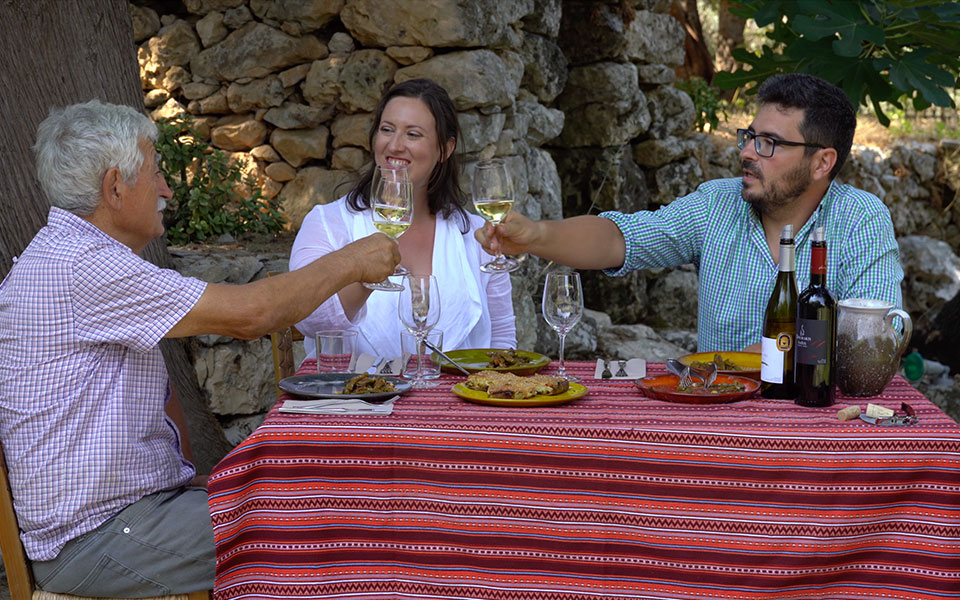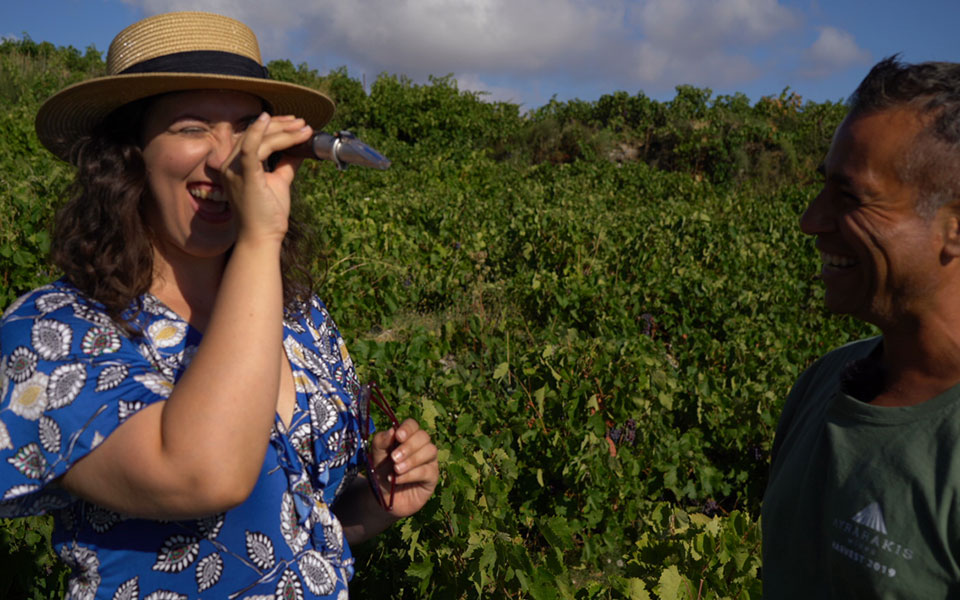How did the idea of making a documentary about Crete’s eleven local wine varieties come about?
While I was studying wine at WSET (Wine & Spirits Education Trust) I realised that Crete is totally absent from the textbooks. Knowing that it is the second biggest wine-producing region in Greece, I saw this as a major omission and set about making a film to introduce it to the American audience.
I took a short course in documentary making, hired a crew, and left Baltimore, where I live, for Crete. All of this happened in August 2020, in the midst of the grape harvest and the pandemic. Today, just a year later, the documentary is being shown at a number of international film festivals.
In the first part of the film, Master of Wine Constantinos Lazarakis, along with Professors Martina and Manolis Stavrakakis of the Agricultural University of Athens, introduce the eleven Cretan varieties of grape, and we also meet eleven winemakers who discuss the specific varieties and the difficulties they each had to overcome. This is a very touching element of the film.
I then visited American and Asian wine experts and asked them if they have tried Cretan wines. The response was unanimous in New York, Boston, Texas and California: none of them had tried anything! Most Americans think of Crete as a holiday destination, for sand and sea, and think the climate is too hot to make good wine. After tasting it, however, they were all impressed by the quality and freshness of Cretan wine. I also found chefs to pair the wines with flavours found here in the United States, from burgers to Asian cuisine.

Did you discover new things about Crete through its wines?
I definitely discovered that Crete has a great variety of microclimates. It is truly magical to taste Vidiano and imagine that the grape has been touched by the sea breeze, which explains its fruitiness and acidity. It is as if you were drinking it next to the sea! Or tasting a wine from a vineyard in the foothills of Psiloritis and sensing the mountain snow. I may be somewhat suggestible, because I was truly enchanted by the landscapes, but the experts in the States agreed with me.
I also rediscovered Cretan hospitality and generosity. At the eleven wineries I visited, I was touched by how they all wanted to promote their island and not themselves. This will help with the extroversion that Cretan wines are in great need of. We have already started private showings of the film in restaurants, with small groups of wine lovers, and many are already asking where they can buy the Cretan wines they are tasting.

What were some of the more special moments of your voyage through Cretan wine?
I was hugely touched to see how dynamic women winemakers are and how much they influence the wine they produce. It was also a unique experience to visit historical monuments related to wine. The abbot of the Toplou monastery in Sitia, Archimandrite Ambrosios Skarvelis, showed me a wine press from the 1700s. It is very moving to touch the stone and see where the wine came from. The same is true of ancient press at Vathypetro in Archanes, and the stone carved presses of Aghios Thomas in Heraklion.
Experiencing with my eyes and my hands the long history of Cretan wine, I grew even more passionate to share and communicate this history to the rest of the world. I find it moving that the way the vines are planted is the same as it was in Minoan times, and that varieties like Vidiano and Liatiko are millennia old. Some of these varieties may also become more prominent due to climate change. Scientists from France and Australia are studying the Vidiano variety for its resistance to drought, to see if it can be cultivated outside Greece.
I was recently invited to Italy to make a similar film about Italian wine. I was impressed when I saw how actively they promote their wines in the United States. We in Greece should also join strengths and show what Greek wine is about!
* “In the Wine Dark Sea” is 90 minutes long, and won first place at documentary film festivals in New York, Tokyo, Napoli and Toronto, while it is included in the official selection for the Cannes Film Festival. In Greece it will be shown in partnership with the Cretan Wine Network and the Prefecture of Crete.












